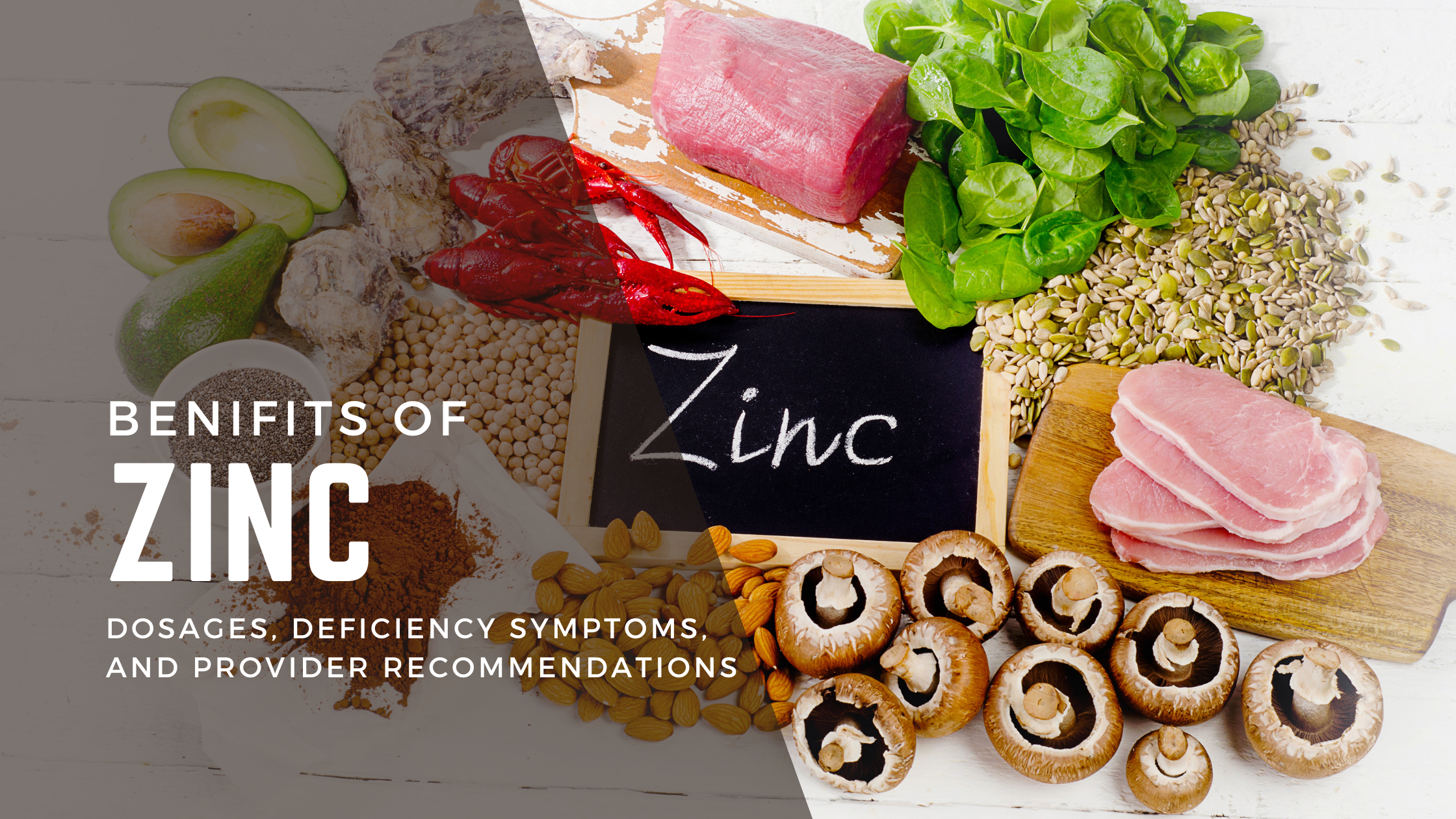
The Essential Benefits of Zinc: Dosages, Deficiency Symptoms, and Provider Recommendations
What is Zinc?
Zinc is an essential trace mineral that plays a crucial role in numerous bodily functions. It is vital for immune system health, wound healing, DNA synthesis, and protein synthesis. Additionally, zinc is involved in cell division and the proper functioning of taste and smell.
Benefits of Zinc
Immune Function: Zinc is critical for the development and function of immune cells. It helps reduce inflammation and enhance the body’s ability to fight off infections .
Wound Healing: This mineral plays a significant role in skin health and repair. Zinc is often used in topical creams for its ability to promote wound healing .
Antioxidant Properties: Zinc acts as an antioxidant, helping to protect cells from oxidative stress and reducing the risk of chronic diseases .
Cognitive Function: Adequate zinc levels are essential for brain health. Some studies have linked zinc deficiency to cognitive decline and increased risk of neurodegenerative diseases .
Hormonal Regulation: Zinc plays a role in hormone production, including insulin, testosterone, and thyroid hormones, contributing to overall hormonal balance .
Usual Dosages
The recommended dietary allowance (RDA) for zinc varies by age, sex, and life stage:
- Adult men: 11 mg/day
- Adult women: 8 mg/day
- Pregnant women: 11 mg/day
- Lactating women: 12 mg/day
Zinc can be obtained through dietary sources such as meat, shellfish, legumes, seeds, nuts, dairy, and whole grains. In some cases, supplementation may be necessary, particularly for those with dietary restrictions or absorption issues.
For supplementation, the usual doses range from 15 mg to 30 mg per day, depending on individual health needs. However, doses should not exceed 40 mg per day for adults, as higher amounts may lead to toxicity .
Signs of Low Zinc Levels
Zinc deficiency can manifest in various ways, including:
- Weakened Immune Response: Increased susceptibility to infections and illnesses.
- Hair Loss: Thinning hair or hair loss can be a sign of deficiency.
- Skin Issues: Conditions like dermatitis, acne, and delayed wound healing may occur.
- Taste and Smell Changes: Reduced ability to taste or smell.
- Fatigue: General fatigue or lethargy without a clear cause.
- Mood Changes: Increased feelings of anxiety or depression .
Recommendations from Healthcare Providers
Consider Copper Levels: Long-term zinc supplementation may lead to copper deficiency, as zinc and copper compete for absorption in the gut. To prevent this, it’s often recommended to take copper supplements alongside zinc, particularly for those on high-dose zinc therapy .
Monitor Dosage and Duration: It’s essential to use zinc supplements as directed and to monitor symptoms of both deficiency and excess. Consulting a healthcare provider for personalized recommendations is crucial.
Dietary Sources First: Whenever possible, aim to obtain zinc through a balanced diet rich in whole foods. Supplements should complement, not replace, dietary intake .
Regular Testing: If you suspect a zinc deficiency or are considering supplementation, talk to your healthcare provider about testing your zinc levels to tailor an appropriate plan .
Zinc is a vital nutrient that offers numerous health benefits, but awareness of proper dosages and potential deficiencies is essential. If you suspect you have low zinc levels or are considering supplementation, consult with a healthcare professional for guidance tailored to your individual health needs.
References
- Dardenne M. (2002). “Zinc: An Essential Nutrient for Health.” Journal of Nutrition.
- Poon, A. (2005). “Role of Zinc in Wound Healing.” Clinical Dermatology.
- Prasad, A. S. (2008). “Zinc: Mechanisms of Host Defense.” Journal of Nutrition.
- K. R. (2016). “Zinc and Cognitive Function.” Neuroscience Letters.
- Kahn, S. E., et al. (1999). “Zinc Supplementation: Effects on Insulin and Glucose.” Diabetes Care.
- National Institutes of Health. (2021). “Zinc Fact Sheet.”
- Shankar, A. H., & Prasad, A. S. (1998). “Zinc and Immune Function: The Biological Basis of Altered Immune Function.” American Journal of Clinical Nutrition.
- A. S. (2004). “Effects of Zinc Deficiency on Health.” Nutrition Reviews.
- Smith, R. (2018). “Copper and Zinc: Balancing the Essential Minerals.” Journal of Clinical Nutrition.
- King, J. C. (2016). “Zinc: A New Role in Bone Health.” American Journal of Clinical Nutrition.
- Lichten, L. A., & Ross, A. C. (2005). “Zinc and Its Role in Human Health.” Nutrition Reviews.
Share this post: on Twitter on Facebook
